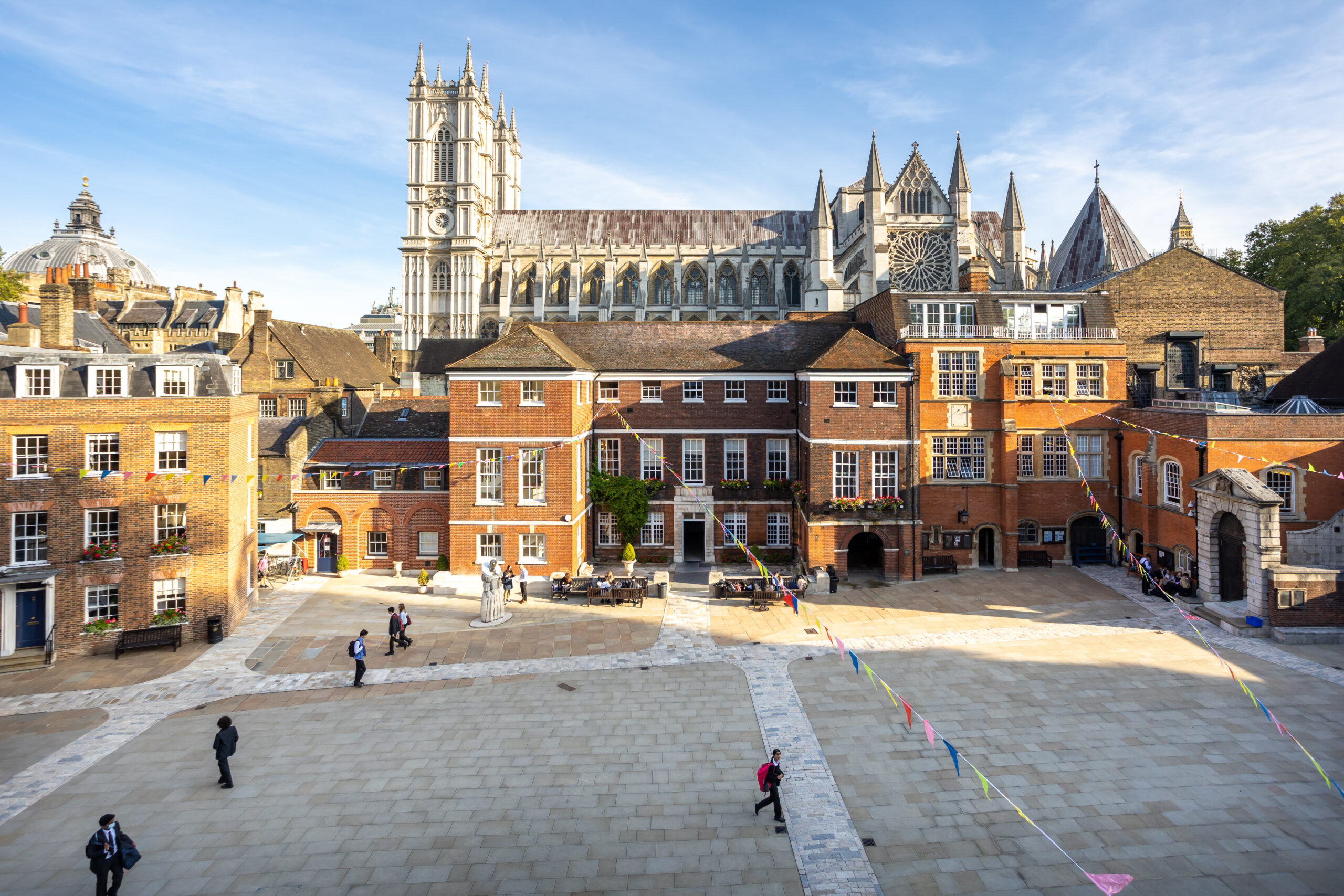
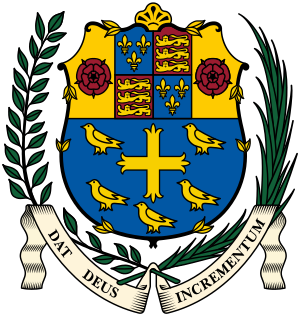
Westminster School’s reputation as one of the world’s foremost centres of academic excellence is built upon our pupils’ genuine enjoyment of open-minded enquiry, rigorous discussion and the search for explanation well beyond any examination syllabus.
Westminster School is a selective day and boarding school for boys aged 13 to 18 and girls aged 16 to 18. There are approximately 360 boys in the Lower School (Years 9 to 11) and 400 boys and girls in the Upper School (Years 12 and 13). One quarter of the pupils board, and the School is structured and run as a boarding school, with an extended day and week and a strong House-based system of pastoral welfare, for boarding and day pupils alike.
Westminster is an ancient school, whose origins can be traced to a charity school established by the Benedictine monks of Westminster Abbey. Its continuous existence is certain from the early 14th century. Henry VIII personally ensured the school’s survival by statute and Elizabeth I, who confirmed royal patronage in 1560, is celebrated as the School’s foundress. Westminster is rare amongst long-established schools in remaining on its original site in the centre of London. Its proximity to Parliament and Westminster Abbey and the use of the Abbey for its chapel, together with the stimulating diversity of the South Bank and West End, account in part for its special atmosphere and outlook.
The School is one of the foremost centres of academic excellence both in this country and internationally. Central to its academic ethos is the dialogue between teachers and their pupils, whether in the classroom or in tutorials, inspiring enjoyment of intellectual inquiry, debate and search for explanation and the development of skills of rational, independent thought well beyond any standard examination syllabus. The desired environment is happy, busy and purposeful; the pupils are intellectually, socially, ethically and politically engaged, with plenty of opportunities to develop initiatives and to articulate and defend their views in line with the enduring values of the liberal tradition reflected in the School’s Charter. That tradition is fully committed also to the nurture of each pupil’s spiritual, moral, emotional and physical development and wellbeing – with a particular emphasis on drawing out individual talent wherever it lies – and to the preparation of young people for fulfilled private and public lives beyond School.
The ethos
The ethos of the School resides in the tradition reflected in the 1560 Elizabethan Charter, which declares: “The youth which is growing to manhood [today we would properly say adulthood], as tender shoots in the wood of our state, shall be liberally instructed in good books to the greater honour of the state”.
Westminster is a highly academic school where individual and institutional excellence are expected and promoted in an atmosphere of open-minded enquiry without dogma, prejudice, or unthinking conformity. This is what we mean by ‘liberal’, enshrined in a broad curriculum which supports the widest possible range of disciplines and activities and encourages the search for deeper understanding which goes well beyond any examination syllabus.
Central to Westminster’s approach is the open dialogue between teachers and their pupils, both inside and outside the classroom. This dialogue inspires passion for the subject, conveys knowledge and develops skills of informed, rational, independent thought, which sustain a lifelong love of learning. What makes Westminster so special is that enjoying one’s learning seeking true mastery of a subject, is warmly encouraged by pupils and teachers alike, supported by the administrative and support staff whose work enables everyone to flourish in an atmosphere of mutual respect, generosity and compassion.
Thus, while academic and other attainments are highly prized, the School is fully committed to the development of each pupil’s moral, emotional, physical and spiritual wellbeing and development. Westminster pupils are all individuals, but they tend to share a commitment to the pursuit of excellence, critical engagement and ethical action. These qualities equip them for admission to the top universities worldwide and for success and fulfilment in whatever careers they choose to pursue as well-informed, well-rounded and kind, responsible adults.
The atmosphere at Westminster is happy, busy and purposeful. The pupils are intellectually, socially, morally and politically engaged. They enjoy opportunities to articulate their views and to listen to other perspectives – in the classroom, society meetings, twice weekly services in Westminster Abbey, and in Latin Prayers. Everyone is welcome, and all may have a voice.
Just as the Founder wished, the School seeks to prepare responsible young people to lead good and useful public and private lives far beyond their formative years at Westminster.
Values
The following might be said to characterise a Westminster education. It is a series of statements designed neither to exhort nor to exhaust but hopefully to encourage.
Enjoying an academic education in which we are “liberally instructed in good books” and encouraged to develop intellectual curiosity, critical self-reflection and a passion for seeking truth through evidence, informed discussion and a healthy scepticism.
Cherishing a culture which marries ambition with compassion, integrity and empathy so that each individual, with all their particular enthusiasms, can flourish safely and happily in a climate of mutual respect and physical, emotional and spiritual wellbeing.
Embracing opportunities to be creative and collaborative, recognising that through the arts, sport, spiritual exploration and service, we can develop our full range of talents and build resilience, confidence and insight as fully rounded human beings.
Challenging prejudice, promoting justice and committing to fairness, equality and inclusion in all our interactions with individuals and communities, proudly conscious that we are a progressive school in the heart of one of the world’s most diverse cities.
Promoting personal responsibility in all that we do, including our behaviour towards others and respect for our shared environment, so that subsequent generations have the opportunity to enjoy the benefits of a liberal education and to make a difference.
Westminster has always cherished idiosyncrasy. At the same time, we know that individual talent is stimulated and supported by the collective pursuit and celebration of excellence.
By working together with kindness, rigour and respect, we can each be nourished intellectually, physically and spiritually as we strive to be good citizens and to achieve distinction.
Vision
Broadly speaking, our vision for the 2020s can be expressed as three main objectives, ever mindful of the need for patience and humility, which is implicit in the School motto: Dat Deus Incrementum.
Transforming lives
We are committed to widening access and becoming needs-blind on entry, as well as supporting families in the School who encounter unexpected difficulties. Mechanisms to achieve these goals include the Ben Jonson Foundation and the George Herbert Fund, both of which are supported by our generous donors.
Transforming experience
We want to ensure that the experience of all our pupils – drawn from as wide a range of backgrounds as possible – continues to evolve and improve over time. This will be achieved by structural and curriculum reviews, capital expenditure, and the harnessing of digital opportunities. A commitment to increase diversity, equality and inclusion in all areas of school life will further enrich the experience of all and equip pupils for informed and sensitive engagement with the twenty-first century world.
Transforming impact
We believe in the value of liberal education and want to work with local and global partners to contribute to positive outcomes for young people in the UK and beyond. This will be achieved by existing programmes like Platform and Horizons, by overseas ventures, and by digital means in order to have the greatest impact.
Taken together, our vision is to cherish, sustain and develop a community of well-rounded scholars, irrespective of financial means, background or beliefs, who care deeply about the life of the mind and the lives of others and who have the educational wherewithal to be good ancestors for those who will build upon our stewardship.
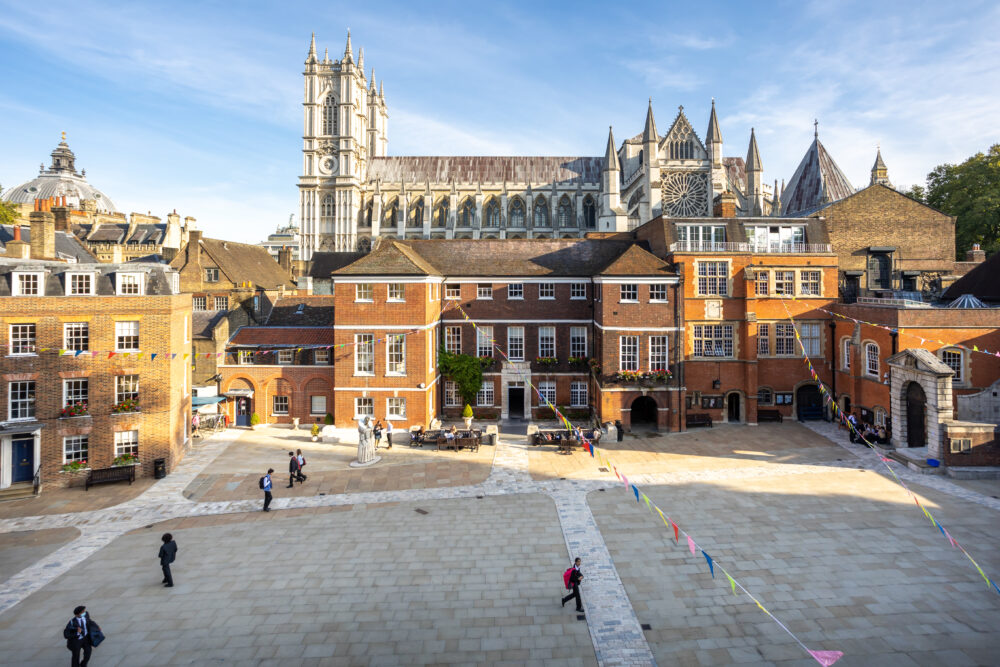
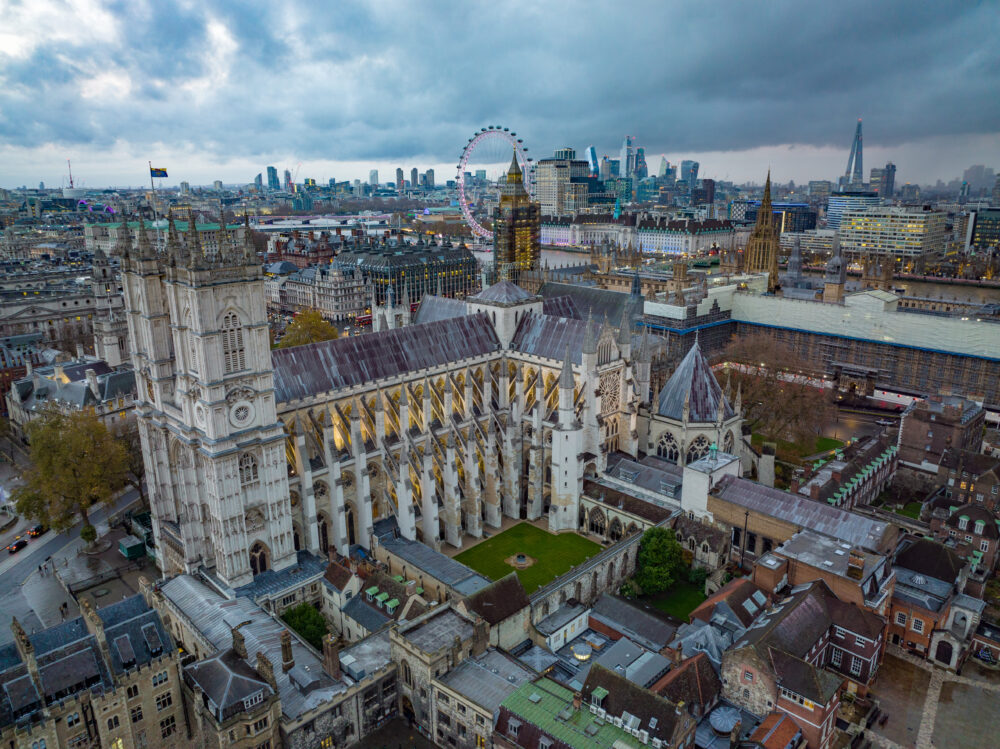
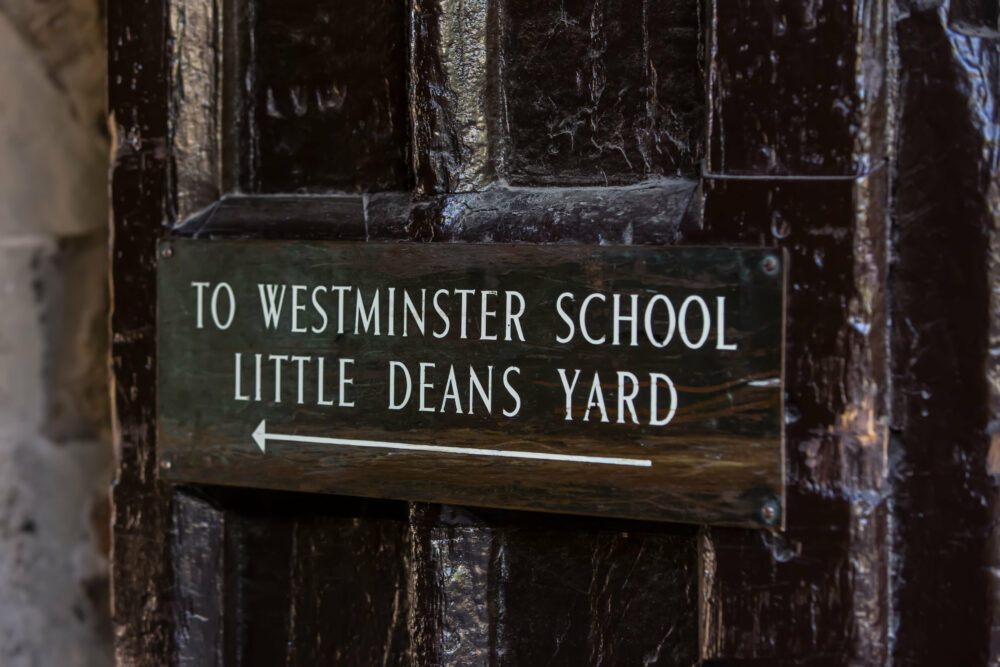
Westminster School is a busy, purposeful and vibrant place to be and an excellent workplace. The community is made up of 750 pupils, 120 teaching staff and 108 support staff.
Westminster School is friendly and welcoming, and all newcomers quickly become part of the rhythm of life here.
There is a real sense of community here as, being a boarding school, many members of staff and pupils live on site and the School’s premises are very much treated as a home away from home. School life starts before breakfast and continues way beyond the working day; as a result, there is always a lively atmosphere in and around School and always someone to share a tea and biscuit with in the Common Room. Support staff as much as teaching staff are encouraged to embrace the School’s day-to-day activities, whether that be attending an evening concert or a morning service in the Abbey.
At Westminster we will always select the best candidate for every position. We do know, however, that we can only truly choose the best person on every occasion if a broad and diverse pool of candidates see the job advertised and are encouraged to apply.
As such, we continue to work on how our job roles are encountered, and particularly welcome applications from groups who have traditionally been underrepresented here.
Westminster School is for everyone, regardless of gender, ethnicity, sexual orientation or any other protected characteristic. We hope you are encouraged to apply.
The successful candidate will provide the day-to-day running of the Payroll, Pensions and Benefits team within the People Department, delivering a first-rate Payroll service and support the implementation of a new Defined Contribution Pension Scheme for Teachers. It is an all-encompassing role working on a variety of payroll, pension and benefits matters.
The successful candidate will provide a complete payroll service, with responsibility for all payroll operations including processing pay, pensions and benefit elements for starters, leavers and other changes, pension administration including Teachers’ Pensions, Defined Benefit and Defined Contribution Schemes, management of private health and other employment benefits and salary sacrifice schemes.
The Payroll, Pensions and Benefits Manager will report to the Director of People and Bursar.
Main responsibilities
PERSON SPECIFICATION
The ideal candidate
All of the following criteria are essential unless otherwise noted.
Qualifications/professional development
Knowledge/experience
Skills and abilities
Line management
Head of Payroll, Pensions and Benefits reports to the Director of People.
Hours of work
09:00 – 17:00, Monday to Friday, with an hour lunch break. The role holder will occasionally be expected to work evenings, as required for special events and other activities. Flexibility will be considered for the right candidate.
Remuneration
£65,000
Holidays
25 days plus 8 Bank Holidays per annum. Annual leave should usually be taken during School holidays.
Anderson Quigley is acting as an advisor to the School, an executive search process is being carried out by Anderson Quigley in addition to the public advertisement.
The closing date for applications is noon on Sunday, February 18 2024.
Applications should consist of:
Should you wish to discuss the role(s) in strict confidence, please contact Hayley Mintern at hayley.mintern@andersonquigley.com, or +44 (0)7596 954 387 or Phil Gifford at phil.gifford@andersonquigley.com, or +44 (0)7743 936 121.